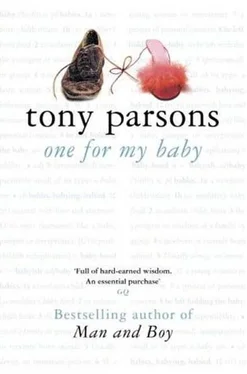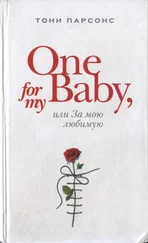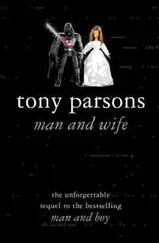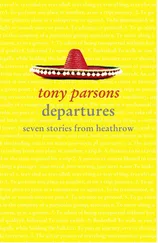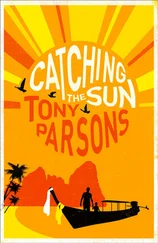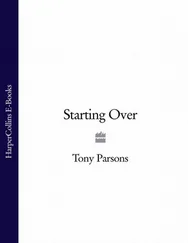“What did he want?” I say, helping her to cart the tea and biscuits to the low table that faces the television. She doesn’t mind me helping with this bit. “I mean, of course he wanted to see you. You’re his mum. But what did he want?”
“To explain. To explain everything, he said. And he brought her with him. Bold as brass. Sitting there holding hands, they were. Like some kind of courting couple. I said-I’ll have none of that in my house. None of your holding hands business. They brought me a box of Quality Street. And then she went and had the strawberry. Bloody cheek. He knows I like the strawberry. I can only eat the soft ones.”
I can believe that my nan has given her son and his girlfriend a hard time. My grandmother was endlessly tolerant when she was visiting my parents. She contemplated all manner of strange phenomena that she has never had any truck with in her life-au pairs, exercise equipment, foreign food, bestselling books-with a benign smile.
But in her own home she makes all the rules and expects you to obey them.
“He says he loves her.”
“Men say a lot of things. You can’t listen to what men say. Men will say anything to get what they want.”
“He says he’s not coming back.”
“I wouldn’t have him back. I’d kick him out. If he came back. I would. If I was your mum, I’d be hoping he came back so I could kick him out. I mean it. I knew something was going on. It’s ridiculous.”
Ridiculous is one of my nan’s favorite words.
“I’m worried about my mum,” I say.
“He’s disgusting.”
Disgusting is another one. She gets a lot of mileage out of ridiculous and disgusting.
“She’s lost without him. She pretends she’s not, but she doesn’t know what to do with herself. She put so much into him.”
But my nan is no longer listening to me. She turns off Sinatra and Count Basie and hits the mute button on the TV’s remote control, really pushing it as hard as she can, as if she has never got used to remote controls. Then she produces her lottery ticket from an old biscuit tin with a kilted Highland piper on the front and stares with rapt concentration at the chortling game-show host who is presenting this week’s live draw.
My nan is happy to debate adultery, miscarriages and fancy women with me.
But only if they don’t clash with the National Lottery.
I SAW THEM EVERY DAY, the old Chinese people moving through the morning mist of Kowloon Park, Victoria Park and Chater Gardens. But I never really noticed them. I saw no beauty and no meaning in their unhurried ballet. They were old and I was young and I believed that there was nothing they could ever teach me.
I saw them doing their slow-motion exercises-saw it most mornings for over two years-but it was never more than a little background color to me. The Tai Chi I saw in Hong Kong registered on the same shallow level as the stalls selling their nameless herbs on Ko Shing Street, the incense smoldering in a temple’s stone cauldrons on Hollywood Road, the skyline full of countless potted plants on the balconies of apartments ten, twenty, thirty stories high, the occasional talk of good and bad feng shui among the Cantonese staff of the Double Fortune Language School, the fake money burned in the streets every August for the Festival of Hungry Ghosts.
I saw all these things but they never even began to have meaning for me, they meant nothing beyond reminding me that I was a thrillingly long way from home. These images were all postcards with nothing written on the back.
But now, when I huff and puff my way around Highbury Fields, looking for a way to live inside my own skin, I see George Chang doing his Tai Chi and somehow this ancient dance finally starts to make sense.
Sometimes he is not alone. Sometimes he has a student or two with him, if you can call them students, these long-haired hippy chicks and those guys with nonaggressive shaved heads and John Lennon spectacles. Alternative types, I think to myself, everything in their lives organic. But they never seem to stick at it for very long, and I am sort of glad about that.
I like to watch him best when he is alone.
It is always very early, that fleeting moment of the day when the whole city seems to be sleeping. All the night people-the drinkers, the ravers, the screamers-have finally gone home to bed but the day people-the joggers, the go-getters, the early worms earning six figures a year-have yet to stir. The only sound is a distant truck barreling down the Holloway Road. This pause never lasts long. But George Chang moves as though he has all the time in the world.
He moves as though he is at once both rooted to the earth and weightless. His arms and hands have the supple grace of wings, slowly pushing and pulling and rising and falling without ever seeming to make any effort at all. As his weight shifts from one foot to the other, his back remains poker straight and his head stays up, an unbroken line running from the base of his spine to the back of his skull.
There’s an air about him that I can’t quite name. At first I think of it as tranquillity but it’s more than that. It is more than serenity. It’s a feeling that combines both peace and strength.
His face is calm, concentrated, composed. His upper body seems impossibly relaxed. It stays relaxed. Perhaps this is what holds my attention so completely. I have never seen anyone so at ease with himself. When he is finished I walk up to him.
“Thanks for the other night,” I say.
He looks at me for a second, placing me.
“How is friend’s nose?”
“Covered in bandages. But you were right. About pushing it back in shape straight away, I mean. Apparently it made it a lot easier to set.”
“Ah. Good.”
“I don’t think I told you. I lived in Hong Kong. I haven’t been back in London for very long.”
He looks up again. I realize he is waiting.
“For two years. I was a teacher. At a language school. I got married out there.”
He nods with what I take to be approval. “Hong Kong lady?”
“English lady.”
I don’t tell him anything else about Rose. I don’t talk about it all the time. I just don’t want to. Historically, the British are meant to be too shy for this sort of thing, for talking about their deepest, darkest feelings to strangers. But I find that’s something else that has changed while I was away, just like Terry Wogan playing REM and my father acting like Rod Stewart. These days the British can’t stop talking about their feelings.
Perhaps Diana had something to do with it, perhaps she persuaded us to exchange our stoic, stiff upper lips for emotional, wobbly bottom lips. Perhaps it’s because the hole in the sky is making not only the weather more Continental but also our temperaments. But our national character has certainly changed.
The problem these days is not getting the British to talk about their feelings. The problem these days is getting them to shut the fuck up.
“I saw a lot of Tai Chi in Hong Kong. In the parks.”
“Very popular in Hong Kong. More than UK.”
“That’s right. But I could never really understand what they got out of it. I mean, it looks great,” I say quickly. “Especially when you do it. I just didn’t get it.”
“Tai Chi for many things. For health. For stress. For stopping your body being attacked.”
“You mean for self-defense?”
“Many kinds of self-defense. You know? Many kinds. You can be attacked inside and outside. There’s the cheeky man who broke your friend’s nose.”
“The cheeky man?”
“The cheeky man. There’s also disease. Tai Chi good for internal organs. For sickness. You know what Chinese word chi means?”
“Well, I know it’s supposed to mean your body’s internal energy. The life force.”
Читать дальше
